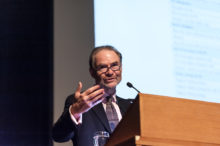DAVIEL LAZURE-VIEIRA
This year marks the 60th anniversary of the Treaty of Rome, the founding agreement of the European Union. And yet, it comes in the midst of an existential crisis. Eurosceptical populism is on the rise in many member states, feeding on echo chambers in the media and on social networks. There are tensions with Ukraine and Turkey, not to mention the refugee crisis and the ebbs and flows of the euro. And there are bigger challenges, too: How will Europe deal with Brexit, Trump and Putin? Will France’s newly elected president Emmanuel Macron and Germany’s Angela Merkel – if, as expected, she wins the German election on September 24 – lead the EU out of the morass?
These were some of the issues that were discussed on September 15 during the Munk School’s annual lecture in European affairs at Isabel Bader Theatre. Part of the Munk School’s Distinguished Lecture Series, the talk was led by Timothy Garton Ash, historian and political writer, and professor of European Studies at the University of Oxford. Ash spoke to a packed house of 500 patrons and shared his diagnosis of the root causes of Europe’s crises. “Europe, like many of us, is prone to tremendous mood swings,” said Ash. “When Le Pen was on the rise in France, it felt like we were back in the early 1930s. But then with the election of Macron, everything seemed great again. We must remain cautious of these sudden shifts and never take anything for granted.”
In fact, Ash argued that this general complacency might explain most of the issues that Europe faces today. “There was this moment of triumph after the fall of the Berlin Wall in 1989, and we just assumed this was a success, that we didn’t need to do anything else. But we should always remember what Polish revolutionary Józef Piłsudski said: ‘To be defeated and not submit, is victory; to be victorious and rest on one’s laurels, is defeat.’”
Ash concluded by offering his perspective on what should come next. “Most of the stories we tell ourselves are national histories with many of the painful parts left out. There is a real task for historians, activists, artists and others to find new narratives that don’t do violence to the historical reality while celebrating what we’ve achieved and pointing towards common hopes and dreams for the future of the liberal international order.”
Ash’s lecture was the latest in an ongoing series of talks with expert guests invited to share their views on the most pressing global issues of our age. “They reflect the Munk School’s commitment to fostering intellectual and public debate,” says Randall Hansen, interim director of the Munk School of Global Affairs. “We have not only joined the global conversation; we’re at the centre of it.”
September 20, 2017
